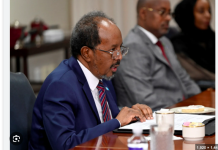
/
RSS Feed
Recent rumors surrounding the health of two African presidents have highlighted how leadership well-being is often treated as a closely guarded state secret. In Cameroon, President Paul Biya, 91, was the subject of speculation, which officials denied, claiming he was in “excellent health.” However, the government quickly banned media from reporting on the matter. Meanwhile, in Malawi, President Lazarus Chakwera’s office responded to similar rumors by posting videos of him jogging and doing press-ups to demonstrate his fitness.

















